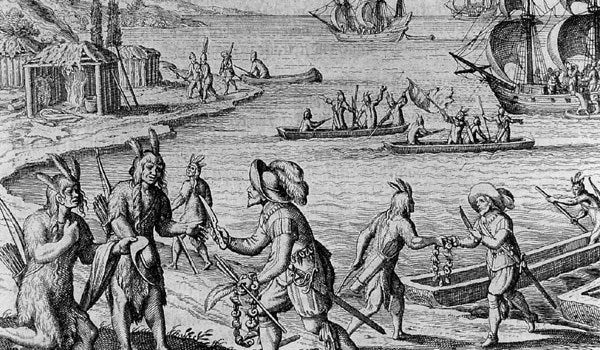Think back (maybe way back) to elementary and high school. What do you remember being taught about First Nations, Metis and Inuit people? From what I remember, Indigenous people were covered in one chapter of our social studies text book. I recall staring at drawings of “Natives” offering baskets of fish and furs to smartly dressed colonizers in exchange for tools and guns, as well as black and white photographs of nameless First Nations people carrying out archaic looking tasks. I remember feeling sorry for the First Nations people because they looked so far behind the colonizers in development; a people stuck in the historical past, being left behind in the face of progress. My family has no First Nations connections, we are Irish/Scottish immigrants who came over during the potato famine, and there were no First Nations people that I knew of at my tiny school or town. Due to this lack of interaction and education about contemporary Indigenous people I assumed that they had all essentially disappeared, leaving behind little but the beautiful and curious artifacts on display in museums.
Clearly, I was incredibly ignorant about Indigenous people and the ideas that I did have were inaccurate and harmful. So the question I have had to ask myself is: Why? In order to attempt an answer to this question I am digging deeply into Western epistemology and the colonial history of this country, which is both a fascinating and exhausting task. There have been times when I have felt deeply ashamed of my own ignorance and the ways in which I have benefitted from colonialism. Other times I been utterly heartbroken and cried late into the night upon learning about the treatment of Indigenous people in Canada; from the deceitful treaties that formed this country, to the unimaginable horrors of the residential school system and the continued exploitation of Indigenous people and their territories today. Looking directly at the truth can be painful, but I know that it is necessary for growth and change. The journey towards reconciliation is personal, it’s transformative and it has opened up my heart and my mind in ways that I never could have imagined. My only wish is that I had learned all of this while I was growing up and not halfway through my life.
I am sharing this because I believe that openness and honesty are the needed at this time and I know that I am not alone in being misinformed and undereducated about First Nations people. The public school system failed me, as it did my parents and my grandparents, but work is finally being done to change that legacy and it’s exciting.
For decades, First Nations have voiced their desire for a culturally appropriate curriculum, one that is informed and written by First Nations people, and it is finally being put into place. In 2016, B.C. implemented a new mandatory First Peoples curriculum in all grades, which is fantastic, but I know from listening to teachers, that this curriculum comes with its challenges. Although non-Indigenous Canadian teachers may want to teach about Indigenous cultures and history, many don’t feel confident enough. They are nervous they’ll say the wrong thing, which, if their education was like mine, makes total sense. This means that in many classrooms the teachers and the students are in the same place, they are learning together.
People are going to make mistakes, vulnerable questions are going to have to be asked and emotions are going to come up. That’s what learning looks like. It requires that we be thoughtful and risk taking. Teachers don’t have to have all the answers. The voices of Indigenous people can be heard by inviting First Nations people to appear in person and through the resources selected. Answering a question with “I don’t know, let’s try and find out together” models humility and can lead to meaningful co-learning experiences. In my own learning I have found that the times when I have asked questions of First Nations people that led to “teachable moments” have been incredibly impactful and only momentarily embarrassing.
At Medicine Wheel Education we are committed to working towards reconciliation and creating resources for teachers that can be used to make this First Nations curriculum a beautiful undertaking. Our authors are speakers that can be booked to visit schools and we are here to support teachers and answer questions. We can’t let fear hold us back from engaging in reconciliation because together we have an incredible opportunity to create change; let’s dive in.
